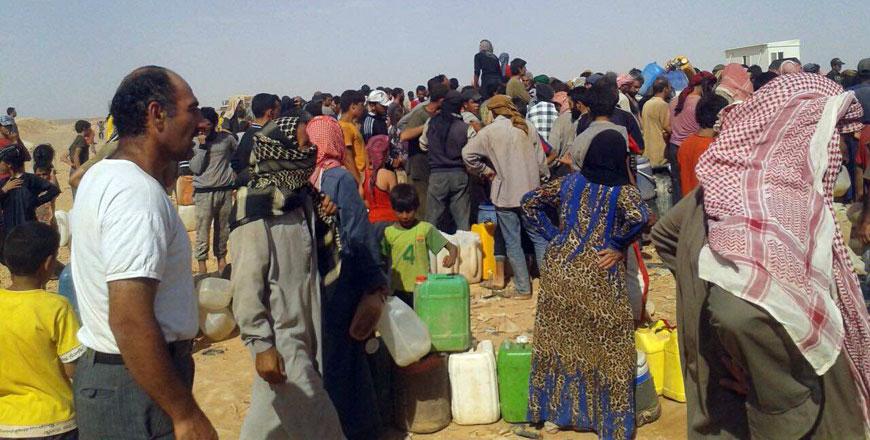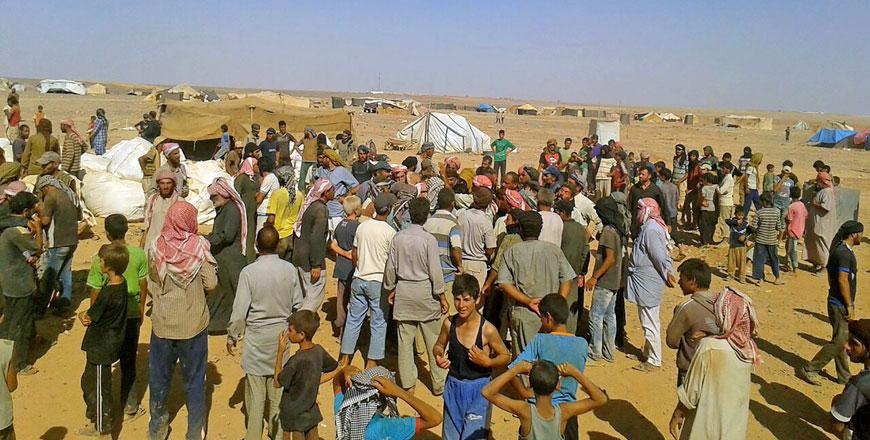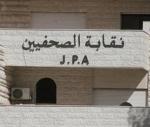You are here
Jordan: World must share responsibility for Syrians
By Mohammad Ghazal , Khetam Malkawi - Jul 03,2016 - Last updated at Jul 03,2016

In this recent photo provided by a Syrian across the border, Syrians stranded in the no-man’s land wait for their turn to receive water rations (JT photo)
AMMAN — Jordan on Saturday rejected any attempts to question its credentials when it comes to its response to Syrian refugees and called upon the international community to shoulder its fair share of the responsibility towards the Syrians stranded on the border.
The call came at a time when international agencies are increasing their appeals for allowing aid to be delivered to more than 85,000 Syrian refugees stranded at the makeshift camp in the no-man’s land between Jordan and Syria called Al Rakban.
The area was closed and declared a military zone after a deadly terrorist suicide bombing late June targeting a forward military post, killing seven soldiers and injuring 13 others.
“We do not accept anyone to question our credentials when it comes to Syrians. We are willing to send Syrian refugees on our borders to any country that might be able to host them…This is an international problem and Jordan is willing to help by taking its fair share of the responsibility but not its entirity,” said Minister of State for Media Affairs and Communication Mohammad Momani in remarks to The Jordan Times Saturday.
“The security of our nation is our top priority,” he said.
The minister said international organisations have several options to send aid to Syrians in need.
“We have always warned from security consequences of the increase in the number of refugees on our border. According to our intelligence and security estimates, the camp has become a harbour for Daesh,” said Momani.
On Friday, the UN and its partners continued to call for the immediate provision of life-saving assistance, including water, food and basic healthcare, to more than 85,000 Syrians estimated to be stranded along the Syrian and Jordanian border area in makeshift tented settlements. Jordan puts the figures at 106,000.
“As of July1, the northern border with Syria remained sealed following the June 21 terrorist attack… the provision of water through a partner of the United Nations Children’s Fund (UNICEF) is the only assistance that has been provided since the attack, but due to disruptions within the community and insecurity, water has not been delivered consistently enough to keep pace with needs. In the extreme heat, delivery of life-saving water, food and basic medical care is absolutely critical,” the UN said in a statement e-mailed to The Jordan Times.
“Some refugees returned to Syria,” the international organisation announced.
Abu Abdullah, a resident of the makeshift camp, said around 15-20 families have been leaving the camp per day and returning to Syria since the closure of the area as a military zone.
“We received some quantities of water, but they are insufficient compared to the large number of Syrians here… We have been getting bread since the attack… It is sold on the Syrian side of the borders and is very expensive,” Abu Abdullah, who did not wish to reveal his full name, told The Jordan Times Saturday.
He added that refugees at the camp started to bring some water from springs inside the Syrian territories, but the water is unfit for human consumption and after families started to get drinking water the number of those who return has been on the decline.
“We are hopeful that the border will be reopened for aid delivery…There is a severe shortage of medical supplies and drugs. There are no medicines for some diseases such as diabetes and asthma,” said the refugee over the phone.
‘Looking into a solution’
World Food Programme (WFP) Spokesperson Shaza Mughrabi said the WFP understands Jordan’s stance, but a solution must be worked out.
“We understand this decision and respect it. We are concerned about the well-being of these people, many of whom are sick, old or women. We are negotiating with the government and other stakeholders to reach them,” Mughrabi said Saturday.
“We are looking to a more sustainable solution for them to receive assistance from inside Syria... Even the situation before the attack was not sustainable… They are not on Jordanian soil… we are working with the government… We are very grateful to the government of Jordan, in Hadalat and Rakban. Without its assistance, we could have not reached these people,” she told The Jordan Times.She added that the last distribution of aid was on the 25th of June.
“We are worried, and even those who received food parcels on the 20th June, they are probably sharing them with others,” she added.
Catherine Osborn, the Norwegian Refugee Council’s (NRC) protection and advocacy adviser said that since the night after the attack at Rakban, NRC has received only very few new arrivals from the borders in Azraq camp”.
Also on Friday, the Human Rights Watch issued a statement, saying Jordan should immediately allow humanitarian agencies to resume life-saving aid deliveries to the Syrians, who it said were “stuck in appalling conditions”.
“Jordan should not be punishing Syrian children, women and men fleeing the same atrocities that killed Jordanian soldiers,” said Gerry Simpson, senior refugee researcher and advocate at the Human Rights Watch. “Other countries should do all they can to help Jordan keep its border open to those in need.”
Calling on international NGOs and organisations to be accurate and objective in their reports, Momani said: “This is not solely our problem. This is the problem of the international community.
“What we have offered to Syrians was not offered by any other country. The world needs to shoulder its responsibility.”
The direct cost of hosting Syrian refugees for the period of 2011 to 2016 is $7.1 billion, including education, electricity, water and subsidised products.
Support identified and requested for meeting government’s demands and host communities’ needs for 2012-2016 has been estimated at $11.5 billion, while the actual support received is $3.3 billion, said the minister, who noted that Jordan is home to 1.3 million Syrian refugees of whom 45 per cent are in the working age.
Related Articles
AMMAN — As Human Rights Watch (HRW) urged the US to help Jordan transfer an estimated 70,000 Syrians stranded on the Kingdom’s border, the g
AMMAN — Syrian refugees at the Rakban camp in the no-man’s-land between the Syrian and Jordanian borders received a new batch of aid on Wedn
AMMAN — Human Rights Watch (HRW) on Wednesday urged Jordan to allow the delivery of relief aid into the no-man's land between the Syrian and














